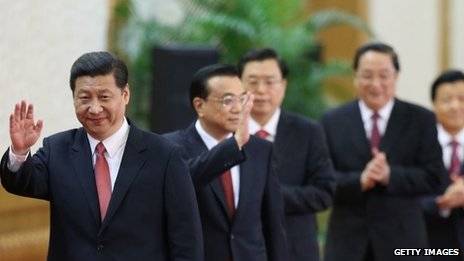http://cdn.breitbart.com/mediaserve...012/Obamas/obama-bobblehead-china-reuters.jpg
Polls decisively show that Americans say they are not better off now than they were four years ago. The same, however, cannot be said for Chinese citizens. A recent poll by the Pew Research Center finds that 70% of Chinese people say their finances are better off now than they were five years ago.
Indeed, the Obama years have been a boon to China economically. Specifically, China has benefited from President Obamas weakness on leveling the trade deficit and cracking down on Chinese currency manipulation.
First, Mr. Obama has failed to make good on his promises to equalize the Chinese-American trade deficit. Chinese exports to America are up and climbing. In September, Chinese exports leapt another 5.5% from the previous year. Why does that matter? Jobs. From 2001 to 2011, America's trade deficit with China killed or displaced over 2.7 million U.S. jobs, 76.9 percent of which came from manufacturing. And 662,100 of those jobs were lost from 2008 to 2011even though Chinese imports dropped when Mr. Obama entered office in 2009.
Second, Obama has failed to crack down on Chinese currency manipulation. By artificially lowering the value of its currency, Chinese companies bidding on projects can quote lower prices than their American competitors. That means fewer jobs for the U.S. and more outsourcing to China.
According to the Peterson Institute for International Economics, even a revaluation of Chinese currency thats less than half of its fair market rate would translate into 300,000 to 700,000 American jobs in two to three years. By some estimates, the current trade deficit costs 1 percent of GDP growth every year. Thats a loss of nearly 1 million jobs annually. Even leftist New York Times columnist Paul Krugman has reluctantly conceded the indefensibility of not cracking down on Chinese currency manipulation. In normal times, wrote Mr. Krugman, Id be among the first people to reject claims that China is stealing other peoples jobs, but right now its the simple truth Something must be done about Chinas currency.
In the second presidential debate, Mr. Romney said that On Day 1, I will label China a currency manipulator, which will allow me as president to be able to put in place, if necessary, tariffs where I believe that they are taking unfair advantage of our manufacturers.
Historically, a strong stance on Chinese currency manipulation followed by rigorous pressure works. From 2005 to 2008, President George W. Bushs Administration took a hard line against Chinas undervalued currency and saw the value of the yuan jump 21% over the three year period. Mr. Obamas record since his first day in office? The yuan has risen just 8.5% in value.
Americans may not be better off economically than they were four years ago, but China is.
From 70% of Chinese Say They Are Better Off Now


Polls decisively show that Americans say they are not better off now than they were four years ago. The same, however, cannot be said for Chinese citizens. A recent poll by the Pew Research Center finds that 70% of Chinese people say their finances are better off now than they were five years ago.
Indeed, the Obama years have been a boon to China economically. Specifically, China has benefited from President Obamas weakness on leveling the trade deficit and cracking down on Chinese currency manipulation.
First, Mr. Obama has failed to make good on his promises to equalize the Chinese-American trade deficit. Chinese exports to America are up and climbing. In September, Chinese exports leapt another 5.5% from the previous year. Why does that matter? Jobs. From 2001 to 2011, America's trade deficit with China killed or displaced over 2.7 million U.S. jobs, 76.9 percent of which came from manufacturing. And 662,100 of those jobs were lost from 2008 to 2011even though Chinese imports dropped when Mr. Obama entered office in 2009.
Second, Obama has failed to crack down on Chinese currency manipulation. By artificially lowering the value of its currency, Chinese companies bidding on projects can quote lower prices than their American competitors. That means fewer jobs for the U.S. and more outsourcing to China.
According to the Peterson Institute for International Economics, even a revaluation of Chinese currency thats less than half of its fair market rate would translate into 300,000 to 700,000 American jobs in two to three years. By some estimates, the current trade deficit costs 1 percent of GDP growth every year. Thats a loss of nearly 1 million jobs annually. Even leftist New York Times columnist Paul Krugman has reluctantly conceded the indefensibility of not cracking down on Chinese currency manipulation. In normal times, wrote Mr. Krugman, Id be among the first people to reject claims that China is stealing other peoples jobs, but right now its the simple truth Something must be done about Chinas currency.
In the second presidential debate, Mr. Romney said that On Day 1, I will label China a currency manipulator, which will allow me as president to be able to put in place, if necessary, tariffs where I believe that they are taking unfair advantage of our manufacturers.
Historically, a strong stance on Chinese currency manipulation followed by rigorous pressure works. From 2005 to 2008, President George W. Bushs Administration took a hard line against Chinas undervalued currency and saw the value of the yuan jump 21% over the three year period. Mr. Obamas record since his first day in office? The yuan has risen just 8.5% in value.
Americans may not be better off economically than they were four years ago, but China is.
From 70% of Chinese Say They Are Better Off Now






